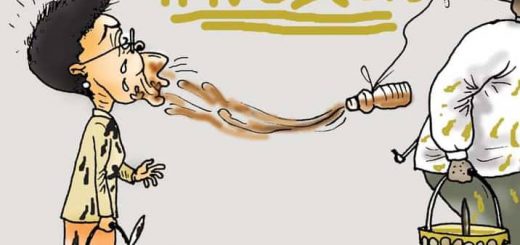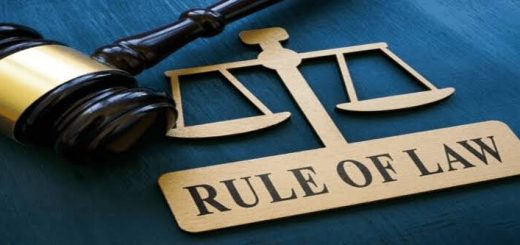How the Inspectorate of Government of (IGG) can successfully combat and fight corruption in Uganda.

Unfortunately both the president of Uganda and Ugandans have lost faith in the Inspectorate of Government (IGG or the IG). Public support and admiration for the Inspectorate of Government has sunk so low that many critics of Beti Kamya allege that it is a demotion for her to be named the head of the most powerful agency in public service. The IG as structured by the framers is a powerful Constitutional body conceived to be a watchdog over other Government agencies to ensure accountability and good governance. The IG is so powerful on paper that it has both semi judicial and delegated legislative powers. The IG is so powerful that it can theoretical put Government agencies under conservorship and supervise the exercise of power by law enforcement agencies including the Police. Then one wonders why such a powerful state agency is subject to such intense redicule, criticism, suspicion and finger pointing. The main reason for this might be the burden of over expectation and the disappointing under achievement of the Inspectorate of Government.
Obviously when an agency is as powerful as the Inspectorate of Government the public places very high expectations on it especially in the face of the high prevalence of corruption in Uganda. The problem of corruption in Uganda is so massive that nearly half the national budget is plundered in grand scale corruption, public service delivery is so horrible and inefficient that Ugandans are not able to access decent public services. Corruption is so prevalent in Uganda that Ugandans can not access public service without paying a bribe because public officers intentionally delay or refuse to deliver services so as to manipulate or blackmail members of the public into paying bribes. In the circumstances, Ugandans are obviously going to be grossly disappointed and disillusioned by the failure of the Inspectorate of Government to make inroads against corruption. As a result the president openly criticizes the Inspectorate of Government and he created a state house Anti-corruption unit to combat and reduce corruption in Uganda instead of relying on the IGG.
Some of us wonder why the president did not simply eliminate the Inspectorate of Government instead of creating a parrallel agency. Maybe it is because of donor pressure, support by the civil Society organizations and the fact that it is a constitutional agency that can only be eliminated by Constitutional amendment. Therefore, instead of eliminating the Inspectorate of Government, President Tibihaburwa created a parallel anti corruption agency to execute the mandate that is vested in the Inspectorate of Government by both the Constitution and statute. As a result we have a unit in the Office of the President that Ugandans believe is more effective and efficient than a constitutional body mandated to combat corruption. A few short years later, the state house Anti-corruption unit is seemingly winning the battle for the hearts and minds of Ugandans simply by appearing to be Combating corruption even though the Inspectorate of Government does more and better work than the unit.
That is the legacy that the new Inspector General of Government and her two deputies are inheriting. An executive that believes it is ineffective and corrupt. A public that is disillusioned by its inefficiency and ineffectiveness and opponents that are better at marketing themselves than the IGG though they do not do even half of the work done by the Inspectorate of Government. Obviously, as we have explained to you elsewhere here, the problem of corruption in Uganda will not be solved by the Inspectorate of Government alone or in a short time frame. Corruption in Uganda can only be eliminated by the combined efforts of the executive, parliament, the judiciary and the public. However, given the extent of the powers of the IG, the state and donor funding it receives and the state of public service, the Inspectorate of Government can on its own make substantial inroads against corruption. Today we shall show you the simple techniques and actions the new Inspector General of Government and her team can implement to earn back the support of the president and public and reduce corruption in Uganda.
- Prevent corruption before it happens by putting in place measures that make it difficult to embezzle public resources and providing oversight to public officers in execution of their duties. For example, get involved in the procurement process to ensure that it is done transparently. Get involved in the recruitment of public officers to prevent tribalism and bribery. There are multitudes of interventions that can be implemented to ensure that corruption never occurs. In this way, the IGG will able to prevent corruption before it occurs. Why wait for a person to plunder public resources and launder them with no hope of them ever being recovered yet the said plunder can be prevented before it occurs.
- Close various loopholes and techniques used by the crooks to extract bribes from members of the public and to embezzle public resources. The Inspectorate of Government has delegated legislative powers that it can use to put in place measures and regulations that prevent corruption before it occurs and provide valuable tools to it to successfully investigate and prosecute corruption. For example, public officers use delay tactics and unnecessary bureaucratic hurdles to intimidate, frustrate, blackmail and manipulate law abiding citizens into paying or offering bribes. At the very least the Inspectorate of Government can reduce delays and eliminate bureaucratic hurdles that public officers use to manipulate people into paying bribes.
- Bridge the information gap by creating new databases and obtaining access to the existing databases. For example how can the Inspectorate of Government given its powers lack access to the Government payment processing system (INFMIS). How can the Inspectorate of Government lack access to the asset registration systems at the Uganda Registration Services Bureau, the Ministry of Lands and Uganda Revenue Authority. How exactly can the IG successfully trace and recover Illicitly acquired wealth without access to property records and other such databases. The new administration needs to address these weaknesses if it wants to make inroads against corruption in Uganda.
- Emphasize the investigation of wealth rather than the current trend of investigating stale complaints. The complaints usually come many years after the fact when evidence has degraded and the proceeds of Corruption have long been laundered, cleaned and intergrated into the financial system. In any case most complaints are so bogus that they waste valuable investigative resources on unprosecutable, baseless and biased allegations. On the other hand, the investigation of wealth present various investigative opportunities not only because wealth is visible but also because it is easy to prove the offense of illicitly acquired wealth. Even where proving the offense of Illicitly acquired is not possible, it is easy to use tax laws to recover a substantial quantity of the wealth. Furthermore, investigating wealth creates a strong deterrent effect as public officers realize that soon or later Illicitly acquired wealth will be confiscated by the state thus reducing the incentive to embezzle public resources and Illicitly acquire wealth.
- Use tax laws to recover Illicitly acquired wealth. In Uganda those that have wealth that is not consummate with their known sources of income have the golden excuses of business, rental and farming income but none of them have the corresponding tax returns to prove acquistion of the income. Tax law allows the state to impose penalties and interest for tax evasion and to recover compound interest on unpaid taxes. Tax law can allow the IG to recover a substantial percentage of the Illicitly acquired wealth without resorting to criminal prosecution which is overly technical and difficult due to the requirement to prove allegations beyond reasonable doubt.
- Rely on the Leadership Code Tribunal for none conviction based asset recovery to take advantage of the low bar of proof on the balance of probabilities. The advantage of civil suits is that the standard of proof is on the balance of probabilities rather than proof beyond reasonable doubt that is required in a criminal trial. The other advantage of the leadership code tribunal is that it is not bound by the formal rules of evidence and it can impose any order that a can be imposed by the High Court. Given the advantages of the leadership code tribunal and the lack of legal personality by the Inspectorate of Government, the IGG should rely on the tribunal as much as legally possible for none conviction based asset recovery.
- Increase reliance on covert investigative techniques. Corruption is an organized crime that usually benefits the participants. Therefore, in many cases, it happens in secret and it is often unreported. Undercover policing produces good evidence, it allows the law enforcement agencies to observe and document the actions of the criminals, exposes new criminal trends and gives the state an opportunity to identify and eliminate public officers that are prone to corruption. Undercover policing creates a deterrent effect by creating the belief that accomplices might be undercover agents and it allows the state to review and process work without interaction between the public officers and the beneficiary. There is no one to bribe when you do not know who is processing your work.
There are other interventions that the new administration of the Inspectorate of Government can implement to make inroads against corruption but we decided to concentrate on those that the IG can implement independent of other agencies. For example, the IG should consider imposing a legal requirement to register all land related transactions but this might require parliamentary authorization. Furthermore, the Inspectorate of Government should champion the reform of anti corruption laws, seek more funding and manpower and propose a corruption adjustment tax.
Read More
- Ideal Amendments that should be included in the Magistrates Courts Amendment Bill 2026 of Uganda
- President Yoweri Kaguta Tibihaburwa Museveni is a minority President voted by only 7,946,772 (36.7%) out of 21,649,608 eligible Ugandan voters in the 2026 Presidential Elections
- Four years of IGG Beti Kamya drowned the Inspectorate of Government (IG) deeper into oblivion and irrelevancy but it Can be redeemed
- The Proposal to Make Magistrates Grade Ones Chief Magistrates is an efficient use of resources that will improve service delivery in Uganda
- If Magistrates Courts in Uganda are less competent and more prone to corruption does it mean that the poor deserve inferior justice to the rich.


